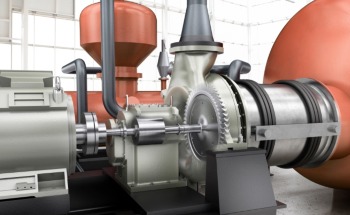Clean power from waste heat

The solution employs silicone oils, which have a lower enthalpy of vaporization than water, and is needed because waste heat produced in industrial plants or power stations often does not have enough energy to drive a turbine with steam. Siemens recently introduced its “Organic Rankine Cycle” module.
Under this solution, the working medium drives a turbine, and then cools and reverts to its initial liquid state. Thus, electricity can be generated without the additional use of energy or raw materials, and without producing additional carbon dioxide emissions.
Conventional power plants usually convert only about 50 percent of fuel energy into electricity, and most of the waste heat is released through a cooling tower. A great deal of waste heat is produced in other industries as well, such as chemicals, glass-making, paper-making and steel production to name just a few examples. It is used often to pre-heat other substances or, if that is not possible and if the waste heat is not hot enough to drive a conventional steam turbine, the valuable energy is wasted.
Using silicone oils, Siemens engineers have succeeded in converting this energy into electricity. These oils have a much lower enthalpy of vaporization than water, and can be used to generate electricity from waste heat of only about 300 degrees.
The Organic Rankine Cycle (ORC) module is derived from the so-called Rankine Cycle, a closed loop used in steam-driven heat engines. In this case, however, organic silicone oils are used as the work medium.
The oil absorbs the waste heat energy by way of a heat exchanger. It turns to vapor and drives a turbine before being completely liquefied again in a condenser and pumped back to the vaporizer. The heat released in the cooling process is also recovered to pre-heat the oil.
The ORC module has an output of up to two megawatts; variants with higher output ratings are expected to come on line in the medium term. The heart of this module is the proven SST-060 steam turbine, which has already been installed successfully more than 850 times. The silicone oil employed in this module is chlorine-free and non-toxic.
All in all, the investment costs and maintenance costs of an ORC module are comparatively low. And thanks to the lower temperatures and pressures and other factors, it is easier to operate than conventional steam-driven turbines. The ORC module features an automatic mode and requires no additional personnel, making it a very economical option for using energy sources more efficiently
Weitere Informationen:
Media Contact
All latest news from the category: Power and Electrical Engineering
This topic covers issues related to energy generation, conversion, transportation and consumption and how the industry is addressing the challenge of energy efficiency in general.
innovations-report provides in-depth and informative reports and articles on subjects ranging from wind energy, fuel cell technology, solar energy, geothermal energy, petroleum, gas, nuclear engineering, alternative energy and energy efficiency to fusion, hydrogen and superconductor technologies.
Newest articles

High-energy-density aqueous battery based on halogen multi-electron transfer
Traditional non-aqueous lithium-ion batteries have a high energy density, but their safety is compromised due to the flammable organic electrolytes they utilize. Aqueous batteries use water as the solvent for…

First-ever combined heart pump and pig kidney transplant
…gives new hope to patient with terminal illness. Surgeons at NYU Langone Health performed the first-ever combined mechanical heart pump and gene-edited pig kidney transplant surgery in a 54-year-old woman…

Biophysics: Testing how well biomarkers work
LMU researchers have developed a method to determine how reliably target proteins can be labeled using super-resolution fluorescence microscopy. Modern microscopy techniques make it possible to examine the inner workings…





















